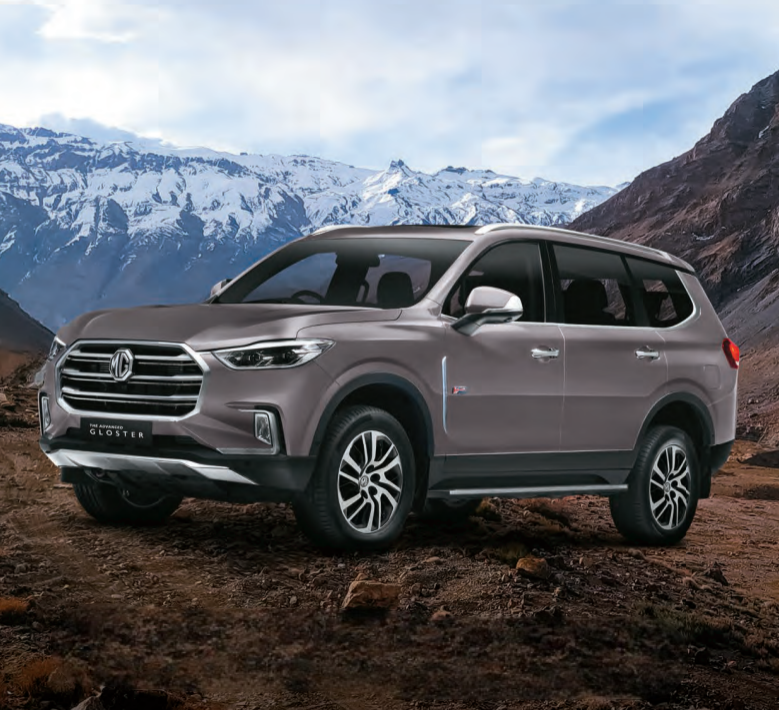What is the mileage of MG Gloster?
The MG Gloster offers different mileage figures depending on the fuel type and transmission. The manual petrol variant delivers up to 0 km/l, while the automatic petrol variant offers up to 0 km/l.


12 - 13 kmpl
Diesel Mileage
Automatic
13 kmpl
2.0 Sharp 7 STR
13 kmpl
Diesel • Automatic
ARAI mileage
Monthly Fuel cost for 40km/day₹8,093
2.0 Savvy 6 STR
13 kmpl
Diesel • Automatic
ARAI mileage
Monthly Fuel cost for 40km/day₹8,093
2.0 Savvy 7 STR
13 kmpl
Diesel • Automatic
ARAI mileage
Monthly Fuel cost for 40km/day₹8,093
2.0 Snowstorm 7 STR
13 kmpl
Diesel • Automatic
ARAI mileage
Monthly Fuel cost for 40km/day₹8,093
2.0 Blackstorm 7 STR
13 kmpl
Diesel • Automatic
ARAI mileage
Monthly Fuel cost for 40km/day₹8,093
2.0 Desertstorm 6 STR
13 kmpl
Diesel • Automatic
ARAI mileage
Monthly Fuel cost for 40km/day₹8,093
2.0 Desertstorm 7 STR
13 kmpl
Diesel • Automatic
ARAI mileage
Monthly Fuel cost for 40km/day₹8,093
2.0 Blackstorm 6 STR
13 kmpl
Diesel • Automatic
ARAI mileage
Monthly Fuel cost for 40km/day₹8,093
2.0 Savvy 6 STR 4WD
12 kmpl
Diesel • Automatic
ARAI mileage
Monthly Fuel cost for 40km/day₹8,767
2.0 Savvy 7 STR 4WD
12 kmpl
Diesel • Automatic
ARAI mileage
Monthly Fuel cost for 40km/day₹8,767
2.0 Desertstorm 6 STR 4WD
12 kmpl
Diesel • Automatic
ARAI mileage
Monthly Fuel cost for 40km/day₹8,767
2.0 Desertstorm 7 STR 4WD
12 kmpl
Diesel • Automatic
ARAI mileage
Monthly Fuel cost for 40km/day₹8,767
2.0 Blackstorm 6 STR 4WD
12 kmpl
Diesel • Automatic
ARAI mileage
Monthly Fuel cost for 40km/day₹8,767
2.0 Snowstorm 7 STR 4WD
12 kmpl
Diesel • Automatic
ARAI mileage
Monthly Fuel cost for 40km/day₹8,767
2.0 Blackstorm 7 STR 4WD
12 kmpl
Diesel • Automatic
ARAI mileage
Monthly Fuel cost for 40km/day₹8,767
Maintain your MG Gloster in top-notch condition by regularly servicing the vehicle.
Be gentle with the accelerator pedal, and avoid sudden acceleration.
Maintain the optimum tyre pressure in your MG Gloster.
Maintain your MG Gloster in top-notch condition by regularly servicing the vehicle.
Be gentle with the accelerator pedal, and avoid sudden acceleration.






The MG Gloster offers different mileage figures depending on the fuel type and transmission. The manual petrol variant delivers up to 0 km/l, while the automatic petrol variant offers up to 0 km/l.
The MG Gloster delivers excellent fuel efficiency in city conditions. The manual petrol variant achieves up to 0 km/l, while the automatic petrol variant delivers up to 0 km/l under typical city driving conditions.
The MG Gloster manual transmission offers up to 0 km/l, while the automatic transmission delivers up to 0 km/l. The difference is minimal, making both options fuel-efficient choices.
The mileage of MG Gloster can be affected by various factors including driving conditions, traffic patterns, vehicle maintenance, tire pressure, and driving style. Under optimal conditions, you can achieve up to 0 km/l with manual transmission and 0 km/l with automatic transmission.
Yes, the MG Gloster is quite fuel efficient. It delivers up to 0 km/l with manual transmission and 0 km/l with automatic transmission, making it an economical choice for daily commuting.
Discover. Decide. Drive.
Explore at your pace, with expert recommendations if needed. Finalise and book your car at the best price.
Financing the right way
Access the best loan options with hassle-free, paperless financing.
Prepare to drive
Schedule delivery for your special day and track updates effortlessly.Schedule delivery for your special day and track updates effortlessly.